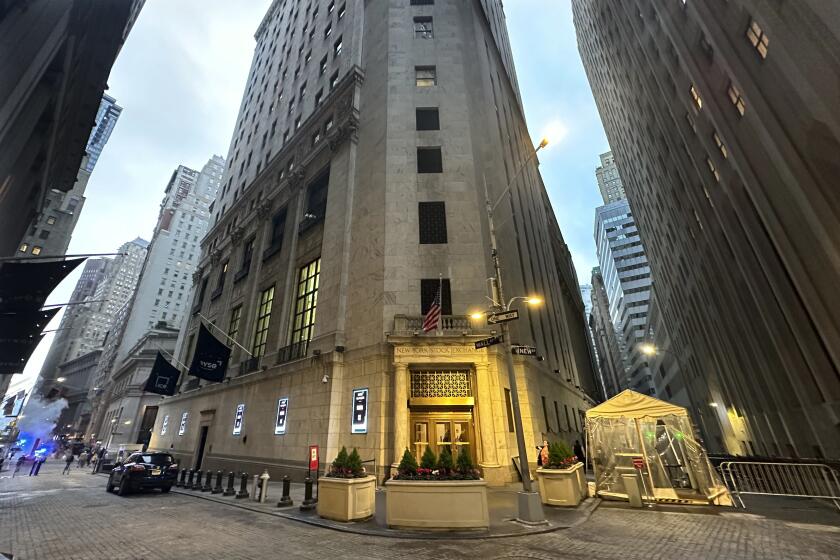Stocks Tumble on Jobs Report
The bull stumbled Friday.
Stock prices fell and bond yields plummeted as Wall Street reacted to a jarring jobs report that caused some analysts to question the staying power of the economic recovery.
The slide brought an end to some significant winning streaks among the major stock gauges, including a seven-day skein by the Nasdaq composite that marked the tech-heavy index’s longest period of gains in 3 1/2 years.
Labor Department figures for August, released Friday, showed that although the unemployment rate fell slightly to 6.1% from 6.2%, the economy actually lost a net 93,000 jobs during the month. Wall Street, which had expected 12,000 to 20,000 positions to be created, reacted swiftly.
The Dow Jones industrial average fell 84.56 points, or 0.9%, to 9,503.34. The Standard & Poor’s 500 index, which was riding an eight-day winning streak, dropped 6.58 points, or 0.6%, to 1,021.39.
Nasdaq, which hit a 17-month high Thursday, declined 10.73 points, or 0.6%, to 1,858.24.
Losers led winners by about 6 to 5 on the New York Stock Exchange and by 9 to 7 on Nasdaq in active trading.
Despite the day’s losses, the S&P; 500 advanced 1.3% for the week. The Dow added 0.9%, and Nasdaq rose 2.6%.
Bond yields, a key indicator of interest rate direction, sank as the weak employment report quieted some fears about whether the improving economy would drive up inflation.
The yield on the benchmark 10-year Treasury note fell to 4.35% from Thursday’s close of 4.51%. The yield on the two-year T-note dropped to 1.71% -- a one-month low -- from 1.89%.
Stock prices have been on a near-relentless rise since March, thanks to a steady stream of positive economic reports. But because stock prices were rising so far so fast, the market really needed “blowout” employment numbers to sustain the rally, said Kevin Marder, chief market strategist at Ladenburg Thalmann Asset Management in Los Angeles.
“Obviously, we didn’t get that,” he said.
“A lot of people saw this as the time to take some chips off the table.”
Adding to the downbeat mood, the FBI issued a global alert for four suspected Al Qaeda terrorists it said may be plotting attacks against U.S. interests, and President Bush announced that he would address the nation over the weekend about Iraq. That too contributed to investor jitters, Marder said.
Most analysts saw Friday’s slump as a minor correction rather than a turning point. However, the unwelcome surprise of the unemployment report left some analysts concerned that the economy may not be able to muster the strength needed to generate additional big gains for stocks this year.
Indeed, if the jobs picture doesn’t improve over the next few months, the nation’s economic health -- and with it, stock prices -- may begin to fade, said Larry Wachtel, market analyst with Wachovia Securities in New York.
“Is the bull market over? I would say no. But if you want to talk about things that go bump in the night, the question is whether the bull market is sustainable,” he said.
“We have economic stimulus from tax cuts and lower interest rates coming through, but you have to ask what will happen when the stimulus starts to fade.
“Will the vigor last without new hiring? That’s the $64,000 question for 2004,” Wachtel added.
Among the day’s highlights:
* Wal-Mart Stores, the world’s largest retailer, tumbled $1.19 to $58.89. Banc of America Securities cut the company to “neutral” from “buy,” saying, “With the stock rapidly approaching our $62 target, we don’t see enough reason to maintain a ‘buy’ rating on the stock.”
* Boeing fell after Senate Armed Services Committee Chairman John W. Warner (R-Va.) moved Thursday to scale back an Air Force plan to lease and then buy 100 Boeing 767s for $22.4 billion. Boeing shares slipped 73 cents to $37.16.
* Shares of used-car dealer CarMax dropped after it said new stores cut into sales at existing stores. CarMax fell $2.39 to $35.45.






